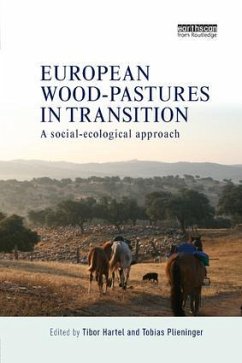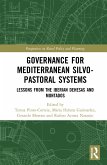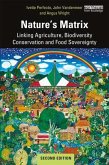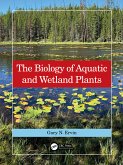Wood-pastures are important elements of European cultural identity and have an exceptional ecological value, yet they are in decline all over Europe. The structure of wood-pastures is strongly influenced by grazing and multiple other land uses and by local and regional environmental conditions.
This book examines the diverse expressions of wood-pastures across Europe. It provides a new perspective, using a social-ecological framework to explore social and ecological values, governing institutions, threats and conservation approaches. It explores the major drivers of decline, which are shown to be related to accelerated cultural, institutional and developmental changes occurring across Europe over the past century. Case studies are included from North-Western, Southern, and Eastern Europe.
Written by renowned scholars and conservationists, the book contributes to developing better, locally adapted conservation policies and management approaches for wood-pastures.
This book examines the diverse expressions of wood-pastures across Europe. It provides a new perspective, using a social-ecological framework to explore social and ecological values, governing institutions, threats and conservation approaches. It explores the major drivers of decline, which are shown to be related to accelerated cultural, institutional and developmental changes occurring across Europe over the past century. Case studies are included from North-Western, Southern, and Eastern Europe.
Written by renowned scholars and conservationists, the book contributes to developing better, locally adapted conservation policies and management approaches for wood-pastures.
"Wood-pastures in their remarkable variety have not had the attention they merit in Europe. The authors of this book bring their richness to life by combining historical as well as ecological and sociological approaches, with some authoritative case histories. It is an important step forward in the literature." - David Baldock, Executive Director, Institute for European Environmental Policy.
"Tibor Hartel and Tobias Plieninger have put together a wonderful volume on European Wood-Pastures in Transition: A Social-Ecological Approach. The book, at the front of social-ecological research, is a most timely and valuable contribution to a deeper understanding of stewardship of social-ecological systems and the services they generate." - Carl Folke, Professor and Director, Beijer Institute, Royal Swedish Academy of Sciences and Science Director, Stockholm Resilience Centre, Stockholm University.
"In a world where agriculture is becoming synonymous with laser-directed plow lines steering crop bed planting, this book opens our eyes to a different farming that is part of nature, with woodlands that provide sustenance for generations, often with breathtaking beauty and resilience. Expert and insightful analyses are offered of complex systems where trees and grass, culture and ecology, tradition and science give rise to sustainable agricultural systems." - Lynn Huntsinger, Professor, Department of Environmental Science, Policy and Management, University of California at Berkeley.
"This book is ultimately an outstanding and alluring call to action for efforts to balance the ecological, economic, institutional, cultural and social components of wood-pastures that are required to guarantee the long term preservation of these landscapes in Europe." - Agroforestry Systems, R. A. Correia, Universidade de Lisboa, Portugal
"Tibor Hartel and Tobias Plieninger have put together a wonderful volume on European Wood-Pastures in Transition: A Social-Ecological Approach. The book, at the front of social-ecological research, is a most timely and valuable contribution to a deeper understanding of stewardship of social-ecological systems and the services they generate." - Carl Folke, Professor and Director, Beijer Institute, Royal Swedish Academy of Sciences and Science Director, Stockholm Resilience Centre, Stockholm University.
"In a world where agriculture is becoming synonymous with laser-directed plow lines steering crop bed planting, this book opens our eyes to a different farming that is part of nature, with woodlands that provide sustenance for generations, often with breathtaking beauty and resilience. Expert and insightful analyses are offered of complex systems where trees and grass, culture and ecology, tradition and science give rise to sustainable agricultural systems." - Lynn Huntsinger, Professor, Department of Environmental Science, Policy and Management, University of California at Berkeley.
"This book is ultimately an outstanding and alluring call to action for efforts to balance the ecological, economic, institutional, cultural and social components of wood-pastures that are required to guarantee the long term preservation of these landscapes in Europe." - Agroforestry Systems, R. A. Correia, Universidade de Lisboa, Portugal
"Wood-pastures in their remarkable variety have not had the attention they merit in Europe. The authors of this book bring their richness to life by combining historical as well as ecological and sociological approaches, with some authoritative case histories. It is an important step forward in the literature." - David Baldock, Executive Director, Institute for European Environmental Policy.
"Tibor Hartel and Tobias Plieninger have put together a wonderful volume on European Wood-Pastures in Transition: A Social-Ecological Approach. The book, at the front of social-ecological research, is a most timely and valuable contribution to a deeper understanding of stewardship of social-ecological systems and the services they generate." - Carl Folke, Professor and Director, Beijer Institute, Royal Swedish Academy of Sciences and Science Director, Stockholm Resilience Centre, Stockholm University.
"In a world where agriculture is becoming synonymous with laser-directed plow lines steering crop bed planting, this book opens our eyes to a different farming that is part of nature, with woodlands that provide sustenance for generations, often with breathtaking beauty and resilience. Expert and insightful analyses are offered of complex systems where trees and grass, culture and ecology, tradition and science give rise to sustainable agricultural systems." - Lynn Huntsinger, Professor, Department of Environmental Science, Policy and Management, University of California at Berkeley.
"This book is ultimately an outstanding and alluring call to action for efforts to balance the ecological, economic, institutional, cultural and social components of wood-pastures that are required to guarantee the long term preservation of these landscapes in Europe." - Agroforestry Systems, R. A. Correia, Universidade de Lisboa, Portugal
"Tibor Hartel and Tobias Plieninger have put together a wonderful volume on European Wood-Pastures in Transition: A Social-Ecological Approach. The book, at the front of social-ecological research, is a most timely and valuable contribution to a deeper understanding of stewardship of social-ecological systems and the services they generate." - Carl Folke, Professor and Director, Beijer Institute, Royal Swedish Academy of Sciences and Science Director, Stockholm Resilience Centre, Stockholm University.
"In a world where agriculture is becoming synonymous with laser-directed plow lines steering crop bed planting, this book opens our eyes to a different farming that is part of nature, with woodlands that provide sustenance for generations, often with breathtaking beauty and resilience. Expert and insightful analyses are offered of complex systems where trees and grass, culture and ecology, tradition and science give rise to sustainable agricultural systems." - Lynn Huntsinger, Professor, Department of Environmental Science, Policy and Management, University of California at Berkeley.
"This book is ultimately an outstanding and alluring call to action for efforts to balance the ecological, economic, institutional, cultural and social components of wood-pastures that are required to guarantee the long term preservation of these landscapes in Europe." - Agroforestry Systems, R. A. Correia, Universidade de Lisboa, Portugal








